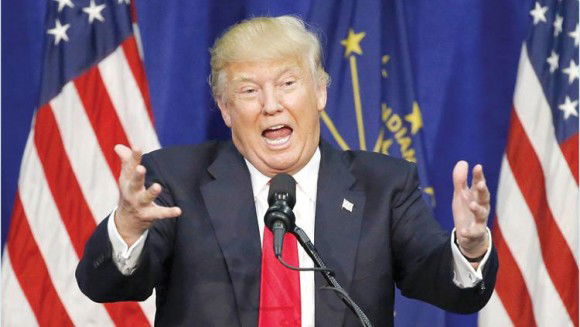America
Reality trumps rhetoric and US President reaffirms 'One China' policy

New York, Feb 10
As reality overtook rhetoric, US President Donald Trump ended uncertainty over commitment to the bedrock principle of Beijing's foreign relations by affirming to China's President Xi Jinping that he would "honour our One China policy".
In his phone call on Thursday night in Washington, Trump set the policy for East Asia on a clearer course ahead of Japanese Prime Minister Shinzo Abe's visit to the White House on Friday.
The long-delayed call came 16 days after Trump's phone conversation with Prime Minister Narendra Modi, and after his talks with various smaller nations since entering the White House.
In the order of calls that appeared to set a hierarchy of friendship, the delay was a challenge to Beijing. But it also was due to the lack of a coherent policy to deal with the complexities of relations with China.
Overall, the development also underscores the new Trump era of foreign relations, more mercantile and transactional, rather than diplomatic.
Reflecting this, his Secretary of State Rex Tillerson is a businessman, who headed Exxon-Mobil, with no government or foreign policy background.
As in a bazaar -- or real estate -- deal, Trump's earlier actions and statements raising prospects of diplomatic ties with Taiwan and taxes on Chinese imports can be seen as the opening bid for transactions and not a definitive statement of policy, as it would be considered in traditional diplomacy.
The Chinese can play this game better than most Europeans -- or the US diplomatic and policy establishments, which find it unsettling
The White House described the call as "extremely cordial" and said, "Representatives of the United States and China will engage in discussions and negotiations on various issues of mutual interest."
Xi "said he appreciated his US counterpart, Donald Trump, for stressing that the US government adheres to the one-China policy", China's official news agency reported. "Trump said he fully understands the high significance of the US government's pursuit of the one-China policy, adding that the US government adheres to the one-China policy."
Trump's conversation with Taiwan's President Tsai Ing-wen in December and his subsequent statements that he could reconsider relations with Taipei roiled Beijing and sent waves of fear and anger in the US political and intellectual establishment, which seemingly reveres China.
Earlier, Trump had said the US could impose tariffs as high as 45 per cent on China's imports because of what he said was its unfair trade practices and that Japan could develop nuclear weapons for its defence.
Finally, reality took over as Trump uneasily settled into office and his handpicked national security and foreign affairs officials took charge -- and the Chinese side took on the challenge of mercantile diplomacy.
China and the US are locked in a tight economic embrace, with the US dependant on cheap imports and Beijing helping prop up the US by buying and holding $1.2 trillion in US treasury bonds - a virtual loan to the US.
In the short term, high tariffs on Chinese imports could lead to higher prices for US consumers and China could also dump its treasury bonds - which it started to do in a small way in December - although it could lead to mutually assured destruction for them, a prospect neither would want.
In Asia, the US needs China's cooperation in dealing with North Korea, which boasts of missiles that could hit Los Angeles, and in dealing with Pakistan.
For Washington, China and Russia getting closer together in lining up against it is also a matter of concern.
The delay in calling Xi was also partially because of China's reluctance to reach out at a high-level with the "One China" policy up in the air.
The matter was probably sorted out ahead of the call and Trump made his first public overture with a letter to Xi on Wednesday greeting him for the Chinese New Year - but 11 days after the event.
Trump's five-year-old granddaughter Arabella was also brought in for soft diplomacy. A video of her singing a New Year song in Mandarin went viral on social media.
(Arul Louis can be reached at [email protected])













































